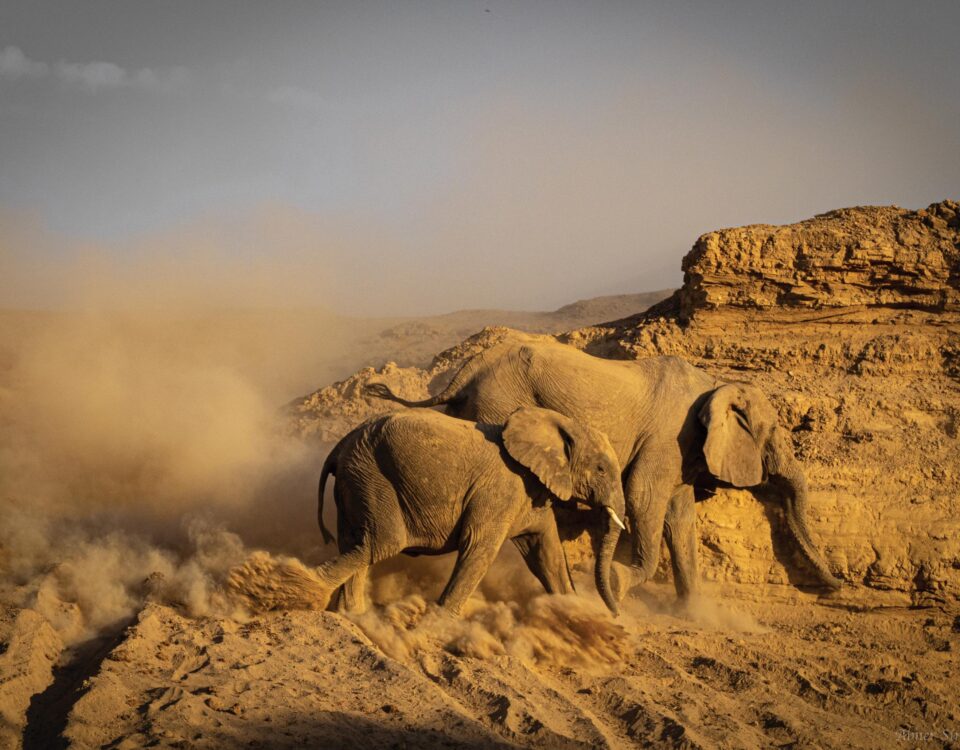Etosha: Onguma Tree Top Camp
September 3, 2012Namibia: Xwama Cultural Village – Setting culture alight
September 3, 2012Journey with the Aakwaluudhi
by Marita van Rooyen
Even though nearly half of Namibia’s population lives in what was traditionally called Ovamboland, the area is often overlooked as a tourist destination. But it is an area rich in cultural and traditional heritage and has great tourism potential. A journey through Uukwaluudhi history was launched with just that in mind.
 The introduction of the book, A journey through Uukwaluudhi history, explains: “Owamboland, or the north-central region as it is now known, is a flat, sandy region intersected by a network of broad, shallow watercourses called oshanas. The area has a semi-arid climate, high temperatures and can be humid. It is mostly inhabited by subsistence farmers, the majority of whom depend on crops and livestock farming. This region is the heart of Namibia, it is densely populated and is considered Namibia’s indigenous and cultural heartland.
The introduction of the book, A journey through Uukwaluudhi history, explains: “Owamboland, or the north-central region as it is now known, is a flat, sandy region intersected by a network of broad, shallow watercourses called oshanas. The area has a semi-arid climate, high temperatures and can be humid. It is mostly inhabited by subsistence farmers, the majority of whom depend on crops and livestock farming. This region is the heart of Namibia, it is densely populated and is considered Namibia’s indigenous and cultural heartland.
“Today the four Owambo regions are home to nearly 50% of Namibia’s population. In 2002, just less than 800 000 Aawambo people lived in the north-central region… Uukwaluudhi is part of the Omusati Region. Tsandi is the main settlement in the area and its constituency is home to over 32 000 people.”
Little-known history
The Aakwaluudhi, comprising one of the seven Owambo tribes, are a relatively new group of people who travelled south from Angola and settled in the Omusati Region. The Kwaluudhi tribe is one of the smallest in Namibia and up until now, little has been recorded about their history. This new book, launched in June 2009, is the first to record the history, traditions, cultures and other facts about this lesser-known indigenous tribe. Apart from offering insight into a group of people who are part of Namibia’s history, but who haven’t been given much of a voice in past years, it also gives the reader a view into what was traditionally called Ovamboland. This colourful book takes the reader on a journey to cultures and traditions that seem far removed from our everyday lives.
Interesting facts are shared: the Aakwaluudhi were of the last indigenous folk to be converted to Christianity; the current king, ‘Tatekulu’ Josia yaShikongo tshaTaapopi, is one of few Kings of the Aakwaluudhi who did not have to fight for the throne; and women are neither considered as rulers nor as chiefs in Uukwaluuhi. There are few celebrations held by the Aakwaluudhi, possibly because many of the customs were stopped by missionaries, but even though many of the Kwaluudhi traditions have died out or faded away over the years, it is still an important part of their cultural heritage and history, which needs to be preserved for future generations.
A journey through Uukwaluudhi history is part of an initiative to provide alternative sources of income to the Tsandi community. Compiled and written by Annie Symonds, the concept of the book was developed by the Namibian Community Based Tourism Assistance Trust (NACOBTA), with funding from the Global Environmental Fund. Together with other information posters and booklets, it is sold to visitors to help reduce rural poverty. Books are available in English, German and Oshiwambo and can be used as an educational resource, stimulating an interest in the cultural heritage of the Tsandi area and the Kwaluudhi people specifically. The books are available at bookshops and curio shops in Windhoek, Swakopmund and Tsumeb, at the Uukwaluudhi Royal Homestead in Tsandi, as well as at a number of lodges.
This article appeared in the Feb/March ‘10 edition of Travel News Namibia.


1 Comment
All what i can say, You are blessed to have that great ideas to present the overwiew of the Uukwaludhi kingdom. i have also done severals research and got some information which some you did not include them. What if i become a member of your group complied those informations which i had gathered during my research studies from our Uukwalludhis elders?